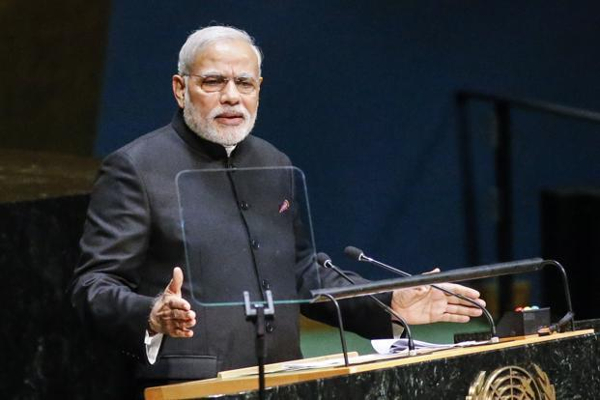NEW DELHI: Prime Minister Narendra Modi will on Monday open high-level segment of the ongoing UN conference on combating desertification at Greater Noida and is expected to announce India’s major initiatives to achieve the country’s goal of ‘land degradation neutrality’ by 2030.
One of the initiatives include creating a huge ‘green path’ running from Mahatma Gandhi’s birthplace at Porbandar in Gujarat to New Delhi as part of the country’s scaled up target to restore minimum 30 million hectares of degraded land – little less than 1/3rd of India’s total degraded land – in a time-bound manner.
Ministers of over 70 countries and Prime Minister of Saint Vincent and the Grenadines, Ralph Gonsalves, will participate at the high-level segment of the Conference (COP14) under the United Nations Convention to Combat Desertification (UNCCD).
Referring to the high-level segment, Union environment minister and COP14 president Prakash Javadekar on Sunday said he was fully confident that more new initiatives (commitments) would come out from it.
The 12-day COP14, inaugurated on September 2, will come out with ‘Delhi declaration’ – a common resolve of over 195 countries on how to stop land from further being degraded and how to quickly restore existing degraded land across the globe.
Currently, India has 96.4 million hectares of degraded land which is 29.3% of the country’s total geographical area (328.7 million hectares). Globally, about 2 billion hectares of degraded land, an area twice the size of China, face degradation.
Land degradation is basically deterioration in quality of topsoil due to excessive or inappropriate exploitation. On the other hand, desertification is land degradation in arid, semi-arid and dry sub-humid areas resulting from various factors, including climatic variations and human activities.
India had in 2015 voluntarily committed restoration of 13 million hectares of degraded and deforested land by 2020 and additional 8 million hectares by 2030 as part of the ‘Bonn Challenge’ pledge which may help it achieve ‘land degradation neutrality’ (LDN) — a state where amount and quality of land resources remains stable or increases within specified temporal and spatial scales and ecosystems.
The LDN is one of the 17 Sustainable Development Goals (SDGs), adopted by the UN General Assembly in 2015, to transform the world through multiple actions by 2030. Total 122 countries, including India, China, Brazil, Russia, Nigeria and South Africa, had agreed to make the goal of achieving LDN a national target.
The ‘Bonn Challenge’ is a global effort, launched by Germany and the International Union for Conservation of Nature (IUCN), to bring 150 million hectares of the world’s deforested and degraded land into restoration by 2020, and 350 million hectares by 2030.
On the eve of the opening of high-level segment of COP14, Javadekar met Zhang Jianlong, China’s administrator of National Forestry & Grassland Administration and both of them explored opportunities for bilateral cooperation in the area of combating desertification within the framework of the UNCCD.
Javadekar said, “We want to tackle the problems scientifically and therefore we are using ultra-modern technologies with the cooperation of others because ultimately desertification has to be a people’s movement”.
Source: IT
Image Courtesy: Mint
You may also like
-
IAF Aircraft Set Course For Exercise Eastern Bridge VII At Oman
-
Trade Connect E-platform For Exports Is Single Window, Fast, Accessible And Transformational: Shri Piyush Goyal
-
India-us Working Together In Areas Like Critical Minerals, Supply Chains And Advanced Technologies: Shri Piyush Goyal
-
Defence Secretary to co-chair 5th India-Philippines Joint Defence Cooperation Committee meeting in Manila
-
2nd India-Japan Finance Dialogue held in Tokyo on 6th September, 2024
